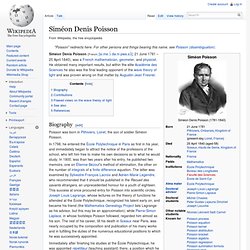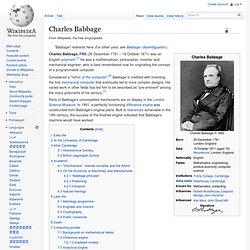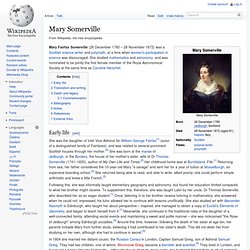

Siméon Denis Poisson. Siméon Denis Poisson (French: [si.me.ɔ̃ də.ni pwa.sɔ̃]; 21 June 1781 – 25 April 1840), was a French mathematician, geometer, and physicist.

He obtained many important results, but within the elite Académie des Sciences he also was the final leading opponent of the wave theory of light and was proven wrong on that matter by Augustin-Jean Fresnel. Biography[edit] Poisson was born in Pithiviers, Loiret, the son of soldier Siméon Poisson. In 1798, he entered the École Polytechnique in Paris as first in his year, and immediately began to attract the notice of the professors of the school, who left him free to make his own decisions as to what he would study. In 1800, less than two years after his entry, he published two memoirs, one on Étienne Bézout's method of elimination, the other on the number of integrals of a finite difference equation. In 1817, he married Nancy de Bardi and with her he had four children. His name is one of the 72 names inscribed on the Eiffel Tower. Contributions[edit] Augustin-Louis Cauchy. Baron Augustin-Louis Cauchy (French: [oɡystɛ̃ lwi koʃi]; 21 August 1789 – 23 May 1857) was a French mathematician who was an early pioneer of analysis.
He started the project of formulating and proving the theorems of infinitesimal calculus in a rigorous manner, rejecting the heuristic principle of the generality of algebra exploited by earlier authors. He defined continuity in terms of infinitesimals, almost singlehandedly founded complex analysis and initiated the study of permutation groups in abstract algebra. A profound mathematician, Cauchy exercised a great influence over his contemporaries and successors. His writings cover the entire range of mathematics and mathematical physics. Biography[edit] Youth and education[edit] Cauchy was the son of Louis François Cauchy (1760–1848) and Marie-Madeleine Desestre.
Cauchy married Aloise de Bure in 1818. Cauchy's father (Louis François Cauchy) was a high official in the Parisian Police of the New Régime. Engineering days[edit] In exile[edit] Charles Babbage. Charles Babbage, FRS (26 December 1791 – 18 October 1871) was an English polymath.[1] He was a mathematician, philosopher, inventor and mechanical engineer, who is best remembered now for originating the concept of a programmable computer.

Considered a "father of the computer",[2] Babbage is credited with inventing the first mechanical computer that eventually led to more complex designs. His varied work in other fields has led him to be described as "pre-eminent" among the many polymaths of his century.[1] Parts of Babbage's uncompleted mechanisms are on display in the London Science Museum. In 1991, a perfectly functioning difference engine was constructed from Babbage's original plans. Built to tolerances achievable in the 19th century, the success of the finished engine indicated that Babbage's machine would have worked. Early life The Illustrated London News (4 November 1871).[8] Babbage was one of four children of Benjamin Babbage and Betsy Plumleigh Teape. After Cambridge Academic. Mary Somerville. Mary Fairfax Somerville (26 December 1780 – 28 November 1872) was a Scottish science writer and polymath, at a time when women's participation in science was discouraged.

She studied mathematics and astronomy, and was nominated to be jointly the first female member of the Royal Astronomical Society at the same time as Caroline Herschel. Early life[edit] Following this, she was informally taught elementary geography and astronomy, but found her education limited compared to what her brother might receive. To supplement this, therefore, she was taught Latin by her uncle, Dr Thomas Somerville, who described her as an eager student.[1] Once, listening in to her brother receive tutoring in mathematics, she answered when he could not; impressed, his tutor allowed her to continue with lessons unofficially. In 1804 she married her distant cousin, the Russian Consul in London, Captain Samuel Greig, son of Admiral Samuel Greig. Translation and writing[edit] The English Cemetery, Naples. Notes[edit]